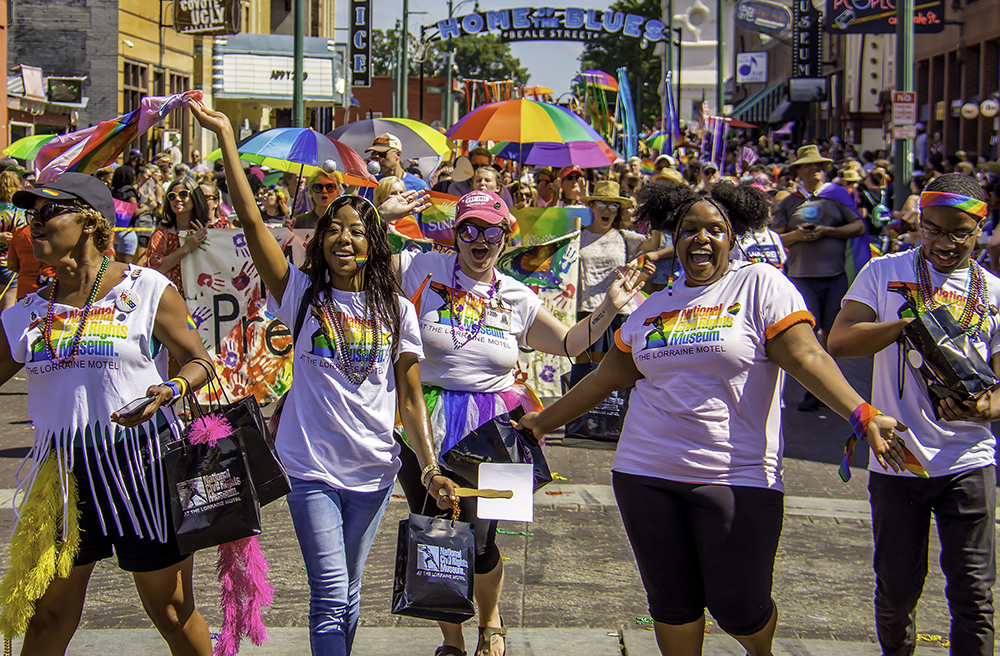Elijah Townsend is one of seven members of the board of directors for the Mid-South Pride Foundation. A born-and-raised Memphian, he says much has changed over his lifetime. “I can remember being a boy and just not feeling safe to be who I was, with things that were inside of my mind. These were natural instincts for me, but I could tell by the reactions of people that something was wrong. Just to be candid, people told me that I was gay before I even knew what the word was and what it meant.”
Today, we see many headlines about a resurgence of homophobic repression. Transphobia became a major plank in the platforms which got both President Donald Trump and Tennessee Senator Marsha Blackburn re-elected. Local LGBTQ groups like Friends of George’s have been fighting a ban on drag performances in Tennessee, the first such law passed by any state legislature.
But in Memphis, Townsend says, “We have teenagers who are able to exist in high school and be who they are. We have a government — as far as the mayor’s office — who supports our community. We have a liaison who we can call and talk to. We have restaurants and allies all around the city, spaces that are safe for us to go if we need resources or help. And so I definitely can tell the difference from being a young man to a more mature man, in the spaces that have been intentionally created for us to progress in our queerness and just be able to feel free and safe.”
The biggest safe space of all is the Mid-South Pride celebration, which will take place in Robert R. Church Park on Saturday, June 7th. The celebration will kick off at 11 a.m. with a parade down Beale Street, and continue into the evening with music, education, community, and, yes, drag. This is a special year, says Mid-South Pride president Vanessa Rodley, as it marks the 50th year for the celebration in Memphis. “This year’s theme is about honoring where we’ve been while amplifying where we’re going. Pride in Memphis began as a grassroots movement, a bold statement of visibility and demand for change. Fifty years later, we stand on the shoulders of those who marched before us, and we’re carrying their legacy forward.”
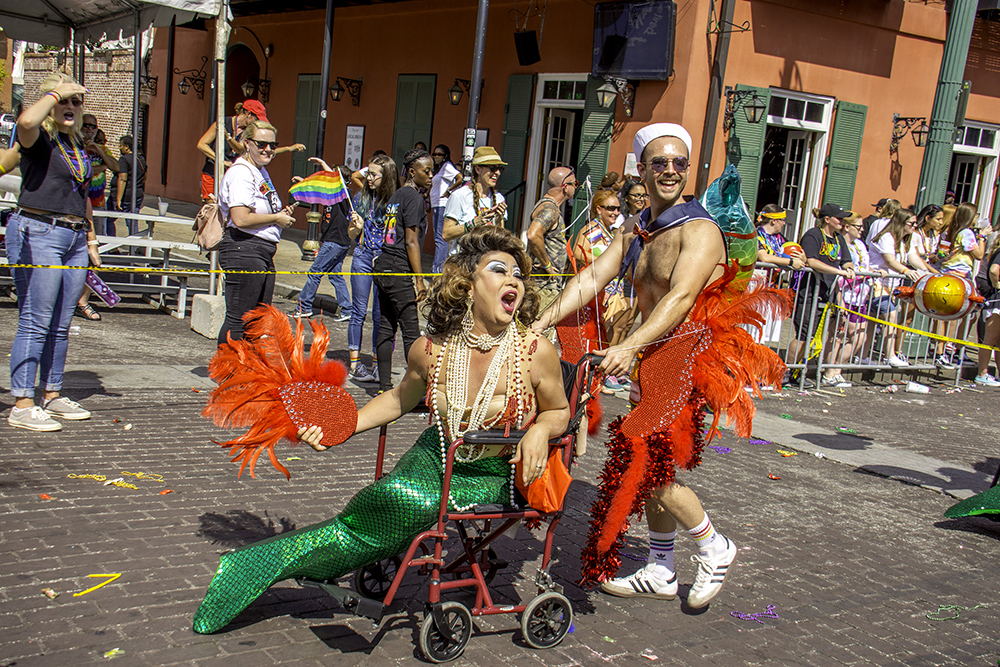
Five Decades of Defiance
The modern LGBTQ rights movement began on June 28, 1969, at the Stonewall Inn in New York City’s Greenwich Village. At the time, there were a few establishments in and around the city where gay and lesbian people gathered under the radar, but they generally didn’t last long, as raids by the vice squad were common and expected. The Stonewall was a Mafia-owned speakeasy and famously the only place in Manhattan where gay men could dance. On this hot summer night, the public morals squad barged in, announcing a raid. But the patrons, some of whom were veterans of the Vietnam War, decided they had had enough. For three nights, protestors and police fought running battles on Christopher Street. When the pioneering alternative weekly newspaper The Village Voice referred to the riots in homophobic terms, protestors surrounded the paper’s headquarters (which were also on Christopher Street) and threatened to burn it down. When it was over, the Stonewall Inn had been destroyed, but a new movement was born.
The movement came to Memphis that Halloween when activist Bill Kendall organized the Miss Memphis Review in the Guild Theatre, now known as Evergreen Theatre. Since dressing in costume was legal for everyone on Halloween, why wouldn’t drag be permitted? Jimmy “Candace” Cagle was crowned the first winner, and the Miss Gay Memphis Pageant became an annual event.
In 1970, thousands marched down Christopher Street in New York City on the first anniversary of the Stonewall riots. The celebrations spread throughout the country, and in June 1976, 35 people gathered in Memphis’ Audubon Park for Gay Day in the Park, organized by the Sexuality and Lesbianism Task Force of the National Organization for Women and the Metropolitan Community Church.
“Mid-South Pride has not always been the curator of Pride here,” says Rodley. “There have been many organizations. We are just the current ones — and hopefully the last ones — but it all started at Gay Day in the Park, 1976.”
The annual celebration of all things queer has evolved over the years, says Ray Rico, publisher of Focus, Memphis’ LGBTQ magazine. “I remember when it was at Overton Park. I remember when it was a small parade in Overton Square. I remember it being at [Peabody] park over on Cooper and Central. I’ve seen the evolution of it, and I know, with the 50-year anniversary coming up, how tremendous it is for our community to have a pride that large, and to have it on historic Beale Street,” he says. “A lot of my friends and family have come over the years, just to attend. I had the honor of being grand marshal one year. It’s nice to be able to share with your community, your friends, and your family.”
In the last 15 years, Pride has grown exponentially. Rodley is a native of Los Angeles, California, who moved to Memphis two decades ago. She first attended a Memphis Pride event in 2010. “I was at the park, and I saw how small it was,” she recalls. “I was not saying the nicest things about it because I’d been used to a huge, three-hour parade down Main Street. The cop cars [in L.A.] have rainbow flags on ’em, and so for me it was a real culture shock. But I was talking trash, and a board member said, ‘You should really put yourself in. If you’re going to say something, you should do something.’ So we all joined up and started volunteering right then and there, and ever since we’ve been trying to grow this to something that we feel like our community deserves. We want everyone to be seen, and to do that, you have to create that environment.”
Last year’s Pride celebration drew an estimated 50,000 people to Robert Church Park, and this year, organizers expect it to be even bigger. “There’s not many Prides in the South until we get to this point in the year,” says Rodley. “Then, a lot of them are in June or in October because of the weather, and also because we all can’t be on the same date. We’re one of the first ones that go out, and we take it as a responsibility to be as loud and as proud and as visible as we can.”
Mid-South Pride remains an all-volunteer organization, and Rodley says the grassroots origins are part of the festival’s core identity. “We have people from all over the world that come to our festival, people from New York, people from Britain, Australia. The biggest compliments I get from these people is how community-centered it feels.”
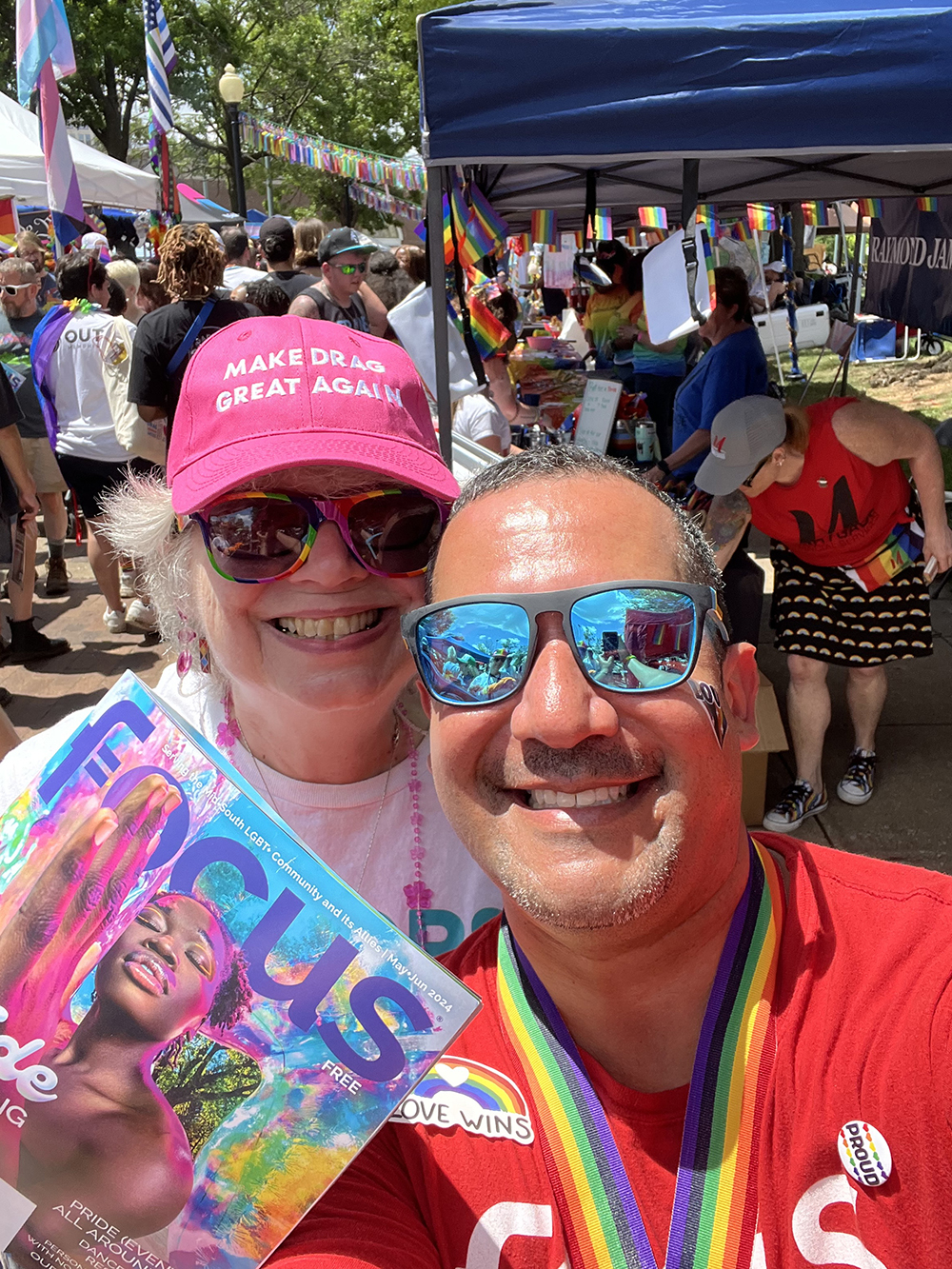
The Best of Times, the Worst of Times
Ray Rico started Focus magazine in 2015. “It was the year that marriage equality became legal, and we thought that there was a place, a space, and a need for a queer publication.”
He says the last decade has been a time of tremendous change in the LGBTQ community. “We’ve gotten more resilient, I would say, than when we first launched with Focus. That era was a good time for us to identify others, maybe even seek out people who weren’t like us. I think that’s the melting pot glory of what we’ve got going on in Memphis. You might live on a street with a millionaire, and you might live on a street with somebody who’s just getting by. It’s just a mix of folks. When it comes to the LGBT spaces, 10 years ago, I started seeing groups collaborate more, and I started feeling more support from others, from allies, from corporations, and from government even. … I’ve seen things change, some of them in good ways and some in not so good ways. I’ve seen people come into Memphis and shake things up. I’ve seen people come into Memphis and F things up, and I’ve seen people come into Memphis and leave and then come back.
“There’s more resilience. There’s more support from our collaborators in the community. So instead of working against each other, we’re working with each other. We’re recognizing that we don’t need to reinvent the wheel. If we have an idea, if there’s somebody over here doing something similar, we work with them to kind of build that up.”
But this increased collaboration has come against a backdrop of increasingly aggressive actions by the Republican supermajority in the Tennessee Legislature, and the election of the most openly homophobic president in recent memory. Thanks to Elon Musk’s DOGE, federal grants for health organizations which provide health services the community depends on have been slashed precipitously.
“On the health side, it’s gotten a little worse,” says Rico. “There are definitely some issues we’re faced with in Memphis. Our HIV rates are the worst — I think they’re number-two for new transmissions. Care for trans folks in Tennessee is terrible because of all the legislative attacks that have come on trans folks.
“For the community, I think there are moves being made, like executive orders, that are not necessarily enforced just yet, but they’re intended to shock and awe. Each day we wake up, we’re understanding what’s different and what are we going to get challenged with today. It gives the community uncertainty because we’re not sure if organizations, programs, housing, medications, if these things are going to be funded or not. And these things are saving people’s lives right now! So essentially, you’re talking about not saving your neighbor or your brother or your friend.
“I am really hurt by what’s going on because I’m seeing firsthand what some of these organizations are being dealt. And I know they’re having to make really tough decisions to eliminate photos, words, and likenesses of things. You can’t say specific things and still get government funding.
“We’ve fought before, absolutely,” says Rico. “But we’re fighting so much harder now that it’s wearing us down. And I think that’s the intent.”
Krista Wright Thayer is one of those fighting back. She’s the advocacy chair for the Mid-South LGBT Chamber of Commerce, as well as a member of the Focus Mid-South Advisory Group. “I guess it started back when the governor took money away from Tennessee for HIV prevention, and that really fired me up. We went to Day on the Hill in Nashville to talk with the legislators, show them that they were wasting money by not giving money to HIV treatment and surveillance. We showed them how much money they were wasting because the diagnosis cost way more than the prevention. It was good conversations with a lot of legislators, and ever since I’ve been an advocate for those in Memphis whose voice isn’t always heard.”
In the wake of the Tennessee drag ban, Thayer says, “I helped organize a meeting with the [Memphis Police Department], as well as the sheriff’s office, … [Congressman] Steve Cohen, and the DA, just to see how is this being enforced. How do you know if someone is in drag? How are you going to check that? How are you going to enforce that? Don’t you have other things to worry about? Where are the resources going? All these executive orders from Trump, they have to be enacted locally. Are we using local resources? Let’s talk about the real things that are going on. They’re trying to enlist fear. All these executive orders have certain organizations having to change their website, scrubbing things off the website that refer to LGBT or even Hispanic culture! In one way, I understand they want to preserve their funding, but in another way, he’s just throwing things at the wall to see what sticks. You can say, no, he cannot do this. There are attorneys involved; there are legislations. And although the judges can’t move as fast as he’s moving with all these executive orders, how you fight back is resistance, right?
“Another type of resistance is joy. We’re not going to be running around in fear. Fuck you. We’re going to be as resilient as we need to. We’re going to do what we need to do. And that’s not bowing down to this fake fascism.”
Thayer says MAGA’s attempts to whip up votes with transphobia are meant to distract. “As Laverne Cox said, people are worried about the wrong 1 percent. The transgender community is 1 percent, and that’s not the ones you need to be worried about. They’re not the ones keeping you from having good education, not the ones upping the charge on eggs and gas, when that’s the very thing [Trump] ran on saying you would not have to pay for those things! People are so far in, and you know what I’m talking about when it comes to his followers, they’re so far in, they still can’t see it. I want our community to know we don’t have to run scared. We’re going to be okay. And some people may disagree with me on this, but as much as they try to throw shade on us, our joy shines through so much more. Their jealousy of not being able to live out loud speaks volumes.”
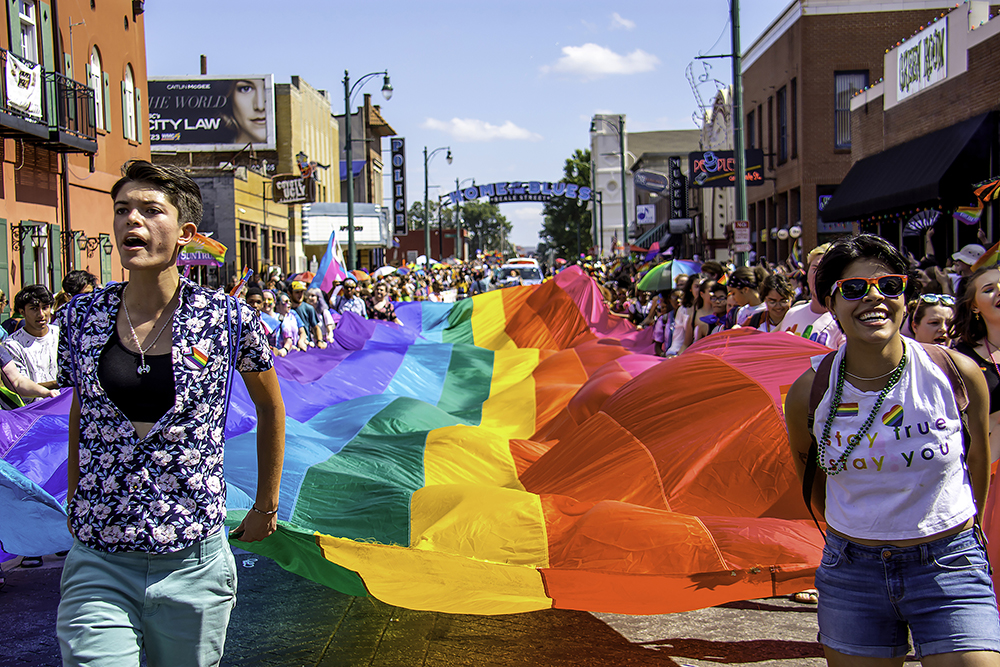
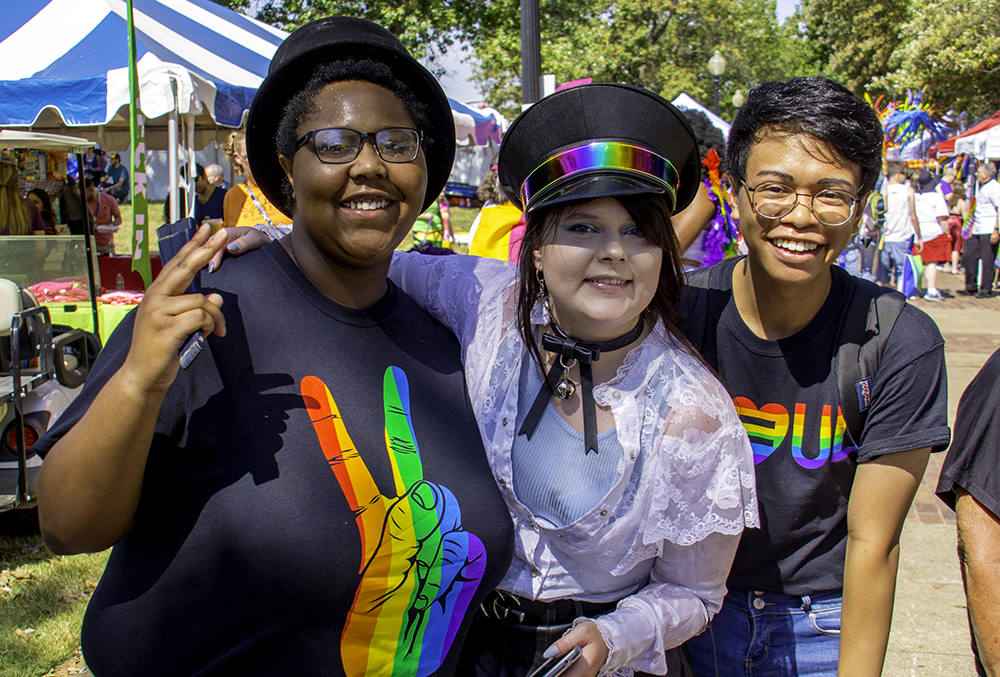
The Mid-South Pride celebration attracts thousands of people from all walks of life to Robert Church Park in Downtown Memphis. (Photo: Kevin Reed | Courtesy Mid-South Pride Foundation, Inc.)
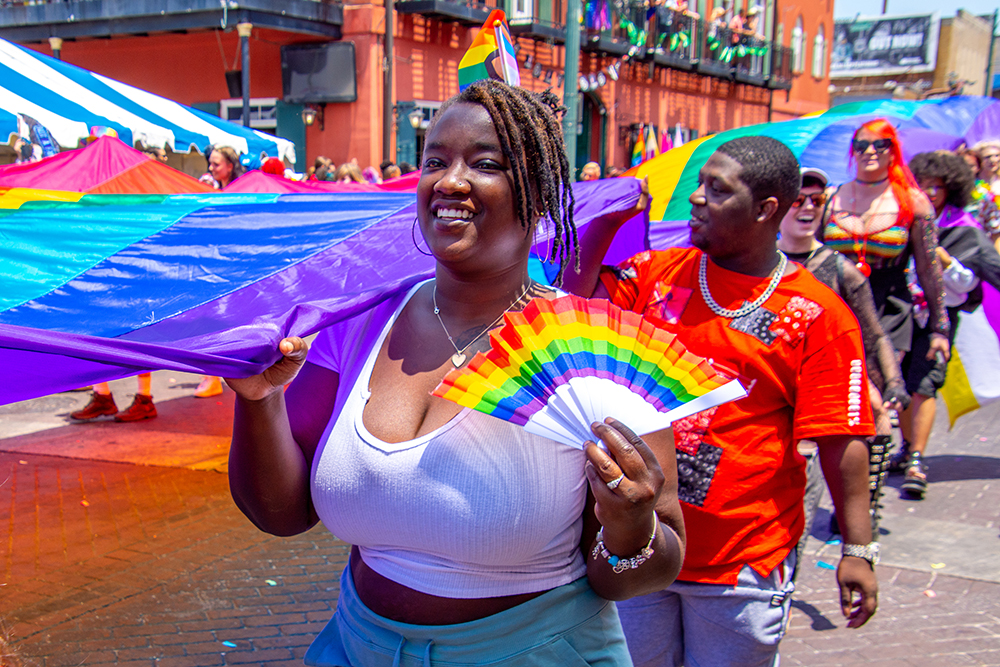
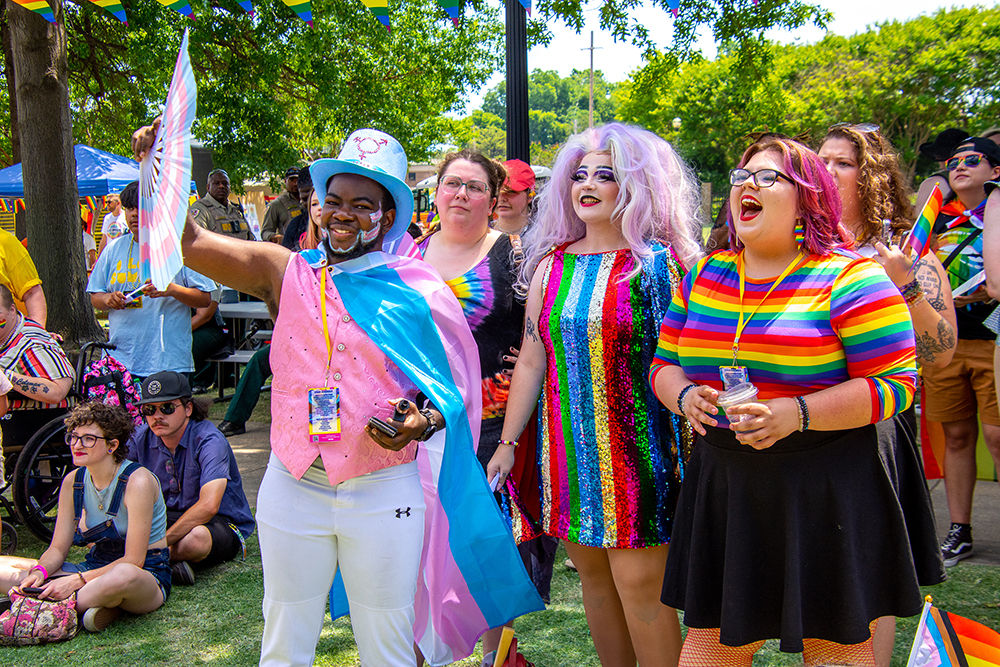
Meeting the Moment with Pride
“My mood is perseverance,” says Townsend. “This is not the first battle we’ve had. It won’t be the last. And, yes, we’ve come so far, but also we still have to continue to work for those who are going to come after us, and make sure that they continue to have a space where they feel heard and seen.”
For Townsend, the reward for all the hard work it takes to put on a giant festival is intangible. “It’s a feeling when you can look out and see all of these varieties of people, men, women, him, her, them, however people identify. You can see the joy they are having just being in the park and feeling free.”
Rodley says safety is her biggest priority. “We hire our own private security team, and that’s who polices the park. We try to make everyone feel safe. It can feel dark sometimes, but we are going to try to bring that light, and that’s why we have a hundred percent no hate in the park, and we charge $3 so we can protect that.”
On this momentous occasion, Rodley feels the weight of history. “It’s very climactic for me,” she says. “One thing I’ve learned living in the South is that history is so important, and hitting that milestone here and at this time, I feel, is very important because we who are a little older, we know that we have not had rights before, and we’ve had to work hard to get them. The younger generation kind of grew up with rights, so they’ve not really had that feeling of having to fight for them. So it’s kind of bridging that gap between us and bringing to light that we can still fight, we can still gain back.”
“What’s important about Pride is, it brings that community back together,” says Rico. “That’s the important thing about Memphis. It’s a big small town. There’s a lot of folks here, but it’s also pretty close-knit. … It’s a celebration of folks who have stood before us, people who are not here anymore. People we’ve lost through violence, people we’ve lost through HIV. It’s a celebration of those folks, too.”
For all of the changes and growth and setbacks, one thing has remained constant. “It is a fight for our rights,” Rico says. “It always has been.”
